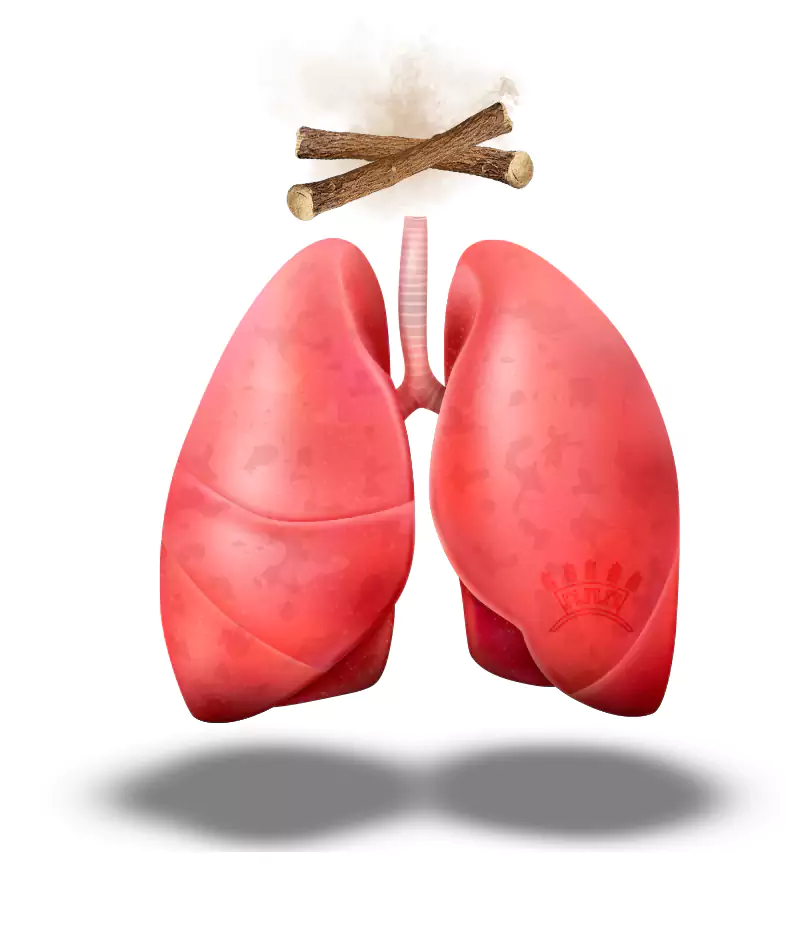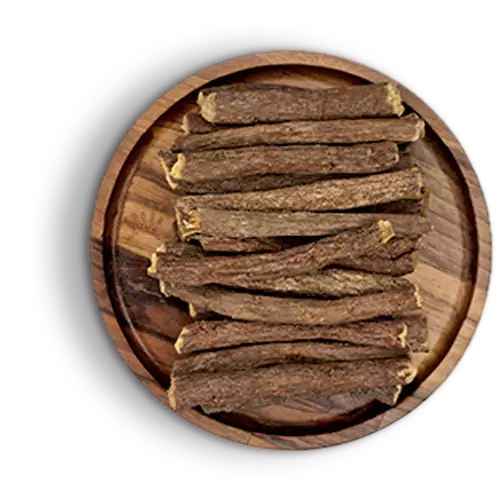Licorice Root Benefits
Licorice root offers numerous health benefits and is widely recognized for its positive effects on the body. It is used in various industries, including food, beverages, pharmaceuticals, and cosmetics, primarily as a natural sweetener and flavoring agent.
Beyond its culinary applications, licorice root is valued in traditional medicine for its ability to treat digestive disorders, sore throat, coughs, and respiratory issues. It also supports the treatment of skin conditions, fatty liver, and stress. Rich in antioxidants, flavonoids, and essential nutrients, licorice root contributes to immune health, helps manage acid reflux, and can even aid in weight loss.
Its versatility and wide-ranging benefits make licorice root a sought-after ingredient in both modern and traditional remedies.
Background
Licorice Root: An Ancient Herb with Modern Benefits
Licorice is a perennial herb with a history of use that dates back to ancient Egypt, where it was offered to Pharaohs in drinks. In traditional Chinese medicine, licorice was revered as an herbal remedy for digestive, skin, and respiratory disorders. Over the centuries, its versatility has extended to various industries, including food, beverages, medicine, tobacco, and cosmetics.
As a natural sweetener and flavoring agent, licorice remains a favorite ingredient in confectionery and culinary applications. Beyond its flavor, licorice offers numerous health benefits when consumed in appropriate quantities, supporting overall well-being.
In this article, we explore the remarkable benefits of licorice root and its essential role in enhancing our health and daily life.

Licorice’s Influence on Digestive Problems
Licorice, in its various forms, has been widely used to address digestive issues. An active compound in licorice root, glycyrrhizin, is particularly effective in alleviating stomach pain, indigestion, heartburn, and acid reflux. Licorice also exhibits antibacterial and antiviral properties, making it useful in treating infections that contribute to gastrointestinal discomfort.
Peptic ulcers, painful sores in the stomach and intestine caused by inflammation with bacteria such as H. pylori, can be treated with licorice root. The glycyrrhizin in licorice helps to heal these sores by reducing inflammation and controlling bacterial growth.
Licorice also contains flavonoids like glabridin and glabrene, which have been shown to soothe stomach disorders, including heartburn. While acid reflux plays a role in digestion, it can cause discomfort when it flows back into the esophagus. Licorice helps to manage acid reflux, preventing heartburn and providing relief.
The combination of licorice’s anti-inflammatory, antibacterial, and soothing properties makes it a valuable natural remedy for digestive health. Its ability to heal and protect the digestive system has solidified its role in traditional and modern medicine.
Licorice Root Benefits for the Respiratory System
Licorice root has long been recognized for its positive effects on the respiratory system, offering relief for various conditions. Research indicates that compounds in licorice, including glycyrrhizic, asiatic, and oleanolic acids, can help slow the progression of bronchitis.
For bronchial asthma, licorice has been a widely used natural remedy for many years. A study conducted on mice demonstrated that glycyrrhizin, a key active compound in licorice root, can significantly improve chronic histopathologic changes in the lungs, reducing inflammation and promoting better respiratory function.
One of the most common issues in respiratory illnesses, such as asthma, is airway inflammation. Licorice root contains potent anti-inflammatory compounds that can alleviate this inflammation, making it an effective treatment option for managing respiratory conditions.
With its anti-inflammatory and soothing properties, licorice root continues to play a valuable role in supporting respiratory health and managing related disorders.

Licorice
Licorice and Skin Diseases
According to Sepidan Osareh Jonoob Co.’s research, licorice is highly beneficial for skin health and is a popular ingredient in cosmetic and skincare products. It is commonly found in creams, ointments, lotions, shampoos, and various other products. Licorice helps to alleviate skin redness, itching, dryness, and swelling, making it an effective natural remedy for numerous skin conditions.
Eczema, a common skin issue characterized by swelling, itching, and redness, can be significantly improved with licorice. Its antiviral, antibacterial, and antioxidant properties protect the skin against harmful factors. Furthermore, licorice’s anti-inflammatory features make it effective in treating conditions like psoriasis and promoting faster wound healing.
Licorice is also beneficial for managing acne, as it reduces inflammation and prevents bacterial infections. Topical gels containing licorice are widely used to soothe and treat various skin ailments, reinforcing its role as a key ingredient in modern skincare solutions.
Licorice Effects on Cancer
Research indicates that licorice possesses properties that may have positive effects on cancer management. It has been found to slow the growth of cancer cells in the body due to its antioxidant, anti-inflammatory, and anti-tumor compounds.
Licorice is also beneficial during chemotherapy treatment, helping to alleviate its side effects. For instance, patients undergoing chemotherapy often develop painful mouth sores, which can be both irritating and distressing. Consuming licorice has been shown to ease this pain, providing comfort and improving the quality of life for patients.
With its potential to complement traditional cancer treatments, licorice continues to be a subject of interest in medical research for its role in supporting overall health and recovery.

Licorice and Dental Health
Licorice offers several benefits for oral and dental health, making it a valuable natural remedy in maintaining a healthy mouth. Its antibacterial, antiviral, and anti-inflammatory properties help combat bacteria that cause cavities and tooth decay.
For centuries, licorice has been used as a natural solution for oral care. It is particularly effective in addressing dental diseases such as aphthous ulcers, gingivitis, dental caries, and periodontitis. By reducing harmful bacteria and inflammation, licorice not only prevents oral health problems but also promotes healing of existing conditions.
With its ability to protect against infections and improve overall dental hygiene, licorice continues to be an important ingredient in natural oral care products.
Licorice in Medicine
Licorice has been a prominent herbal treatment in traditional medicine across Asia, including Iran, India, China, and Egypt, where it was widely used to treat conditions related to the kidneys, lungs, liver, digestive system, and respiratory tract.
In modern medicine, licorice continues to hold importance due to its anti-inflammatory, antiviral, and soothing properties. It is commonly found in topical gels, ointments, cough syrups, capsules, and tablets. Licorice is also used to alleviate sore throat pain, particularly after surgeries involving anesthesia, demonstrating its effectiveness as a natural remedy for post-surgical recovery.
Its versatility and therapeutic benefits make licorice a key ingredient in a wide range of medicinal formulations today.
Nowadays licorice is popular in medicine such as topical gel and ointment, cough syrup, capsule and tablets. It can be used after surgery to reduce the sore throat.
Licorice Influence on Menopause
One of the common symptoms of menopause is the sudden onset of warmth, often described as hot flashes, which affects the face, neck, and chest. This can cause redness, sweating, and an overall feeling of discomfort, frequently leading to frustration among women experiencing it.
Research suggests that licorice root can play a positive role in reducing the intensity and frequency of hot flashes during menopause. Its natural phytoestrogen compounds may help balance hormonal fluctuations, providing relief from this bothersome symptom.
Licorice is gaining recognition as a natural alternative to alleviate menopausal discomfort, offering women a safer and more holistic approach to managing this phase of life.
Licorice and Hepatitis C
Hepatitis C, if left untreated, leads to liver inflammation and progressive liver damage over time. Research suggests that glycyrrhizin, a key compound found in licorice root, possesses antiviral and anti-inflammatory properties that can combat Hepatitis C and potentially aid in its treatment.
Glycyrrhizin has shown effectiveness in reducing liver inflammation and protecting liver cells from further damage. It also helps manage oxidative stress in the liver, which is often associated with this condition. As a result, licorice root is being explored as a complementary remedy in the management of Hepatitis C.
Licorice Impact on Stress
Licorice is widely recognized for its ability to reduce stress. It supports the adrenal glands by stimulating their function, which helps maintain a healthy balance of cortisol, the hormone responsible for managing stress in the body.
By stabilizing cortisol levels, licorice not only alleviates the physical symptoms of stress but also promotes overall mental well-being. This makes licorice an effective natural remedy for individuals dealing with chronic stress or adrenal fatigue.
The Effect of Licorice on Infections
Licorice has been shown to have a positive impact on various types of bacterial and viral infections, including short-term infections (like the common cold), chronic infections (which last for extended periods), and latent infections (dormant infections that can reactivate).
Chinese research has identified two key compounds in licorice root with antiviral properties, namely glycyrrhizin (GL) and glycyrrhetinic acid (GA). These compounds are known to weaken viral activity by disrupting viral genes and replication processes.
In addition to its antiviral effects, licorice contains flavonoids, which exhibit potent antibacterial properties. These components help combat bacterial infections, making licorice an effective natural remedy for a wide range of infectious diseases.
Licorice and Sore Throat
Licorice is widely recognized for its soothing effects on a sore throat, making it a valuable remedy in various forms. After surgeries that require the use of a breathing tube, patients often experience throat discomfort or pain. Studies suggest that consuming licorice lozenges can help alleviate this pain effectively.
Licorice is commonly used in the form of tea, lozenges, or sprays to reduce throat inflammation, soothe irritation, and relieve discomfort. Its anti-inflammatory and antimicrobial properties make it an ideal natural remedy for managing post-surgical throat pain and other conditions causing soreness.
Other Benefits of Licorice Root to Our Health
Licorice root provides numerous additional health benefits beyond its commonly known uses:
- Boosts Stress Recovery: Licorice helps the body cope with stress by supporting adrenal gland function and promoting a healthy cortisol balance.
- Allergy Relief: It has anti-inflammatory properties that alleviate symptoms of allergies and reduce related discomfort.
- Improves Gum Health: Licorice combats bacterial infections in the mouth, making it beneficial for preventing and treating gum diseases.
- Reduces Cholesterol Levels: Regular consumption of licorice can help lower high cholesterol and triglyceride levels, promoting cardiovascular health.
- Liver Protection: Licorice supports liver health by reducing inflammation and protecting against oxidative damage.
- Aids Weight Loss: It is effective in reducing body fat mass and supporting weight management when used as part of a balanced diet.
These additional benefits make licorice root a versatile and valuable natural remedy for enhancing overall health and well-being.
Licorice in Food and Drinks
Licorice is a versatile plant that grows in regions such as Southern Europe, Greece, Turkey, Iran, China, and others. Known for being 50 times sweeter than sugar, licorice serves as a natural sweetener and is widely used in food, beverages, sweets, candies, pastilles, and even in medicines. Additionally, it is a sought-after flavoring agent popular in cooking and the tobacco industry.
Licorice’s unique flavor is utilized in various products, including candies, sweets, throat lozenges, tobacco products, toothpaste, and more. Its dual role as a sweetener and flavor enhancer makes it an essential ingredient in numerous industries.
Provided by: Sepidan Osareh Jonoob Co.
Latest Licorice Articles and News
Uses of Licorice in Cooking
Uses of Licorice in Cooking Licorice has been used for centuries in both cooking and traditional medicine. Known as a natural sweetener and flavoring agent, licorice not only enhances the taste of dishes but also offers numerous health benefits. It serves as an...
The Industry and Mining Qualified Unit of Fars Province
The Industry and Mining Qualified Unit of Fars Province The 25th Celebration of Industry, Mining, and Trade in Fars Province was held on December 14, 2021 (23rd of Azar, 1400) in Shiraz, with the participation of national and provincial officials. The 25th...
Licorice in Traditional Indian Medicine
Licorice in Traditional Indian Medicine Licorice (Glycyrrhiza glabra) has held a prominent place in traditional medicine systems across ancient cultures, including those of Iran, India, China, and Egypt. This versatile herb grows naturally in various regions, such as...



